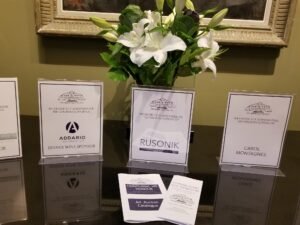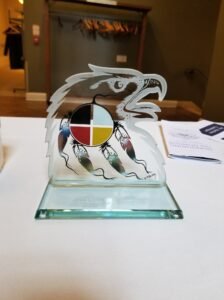1. Giiwedin Anang Council
The Giiwedin Anang Council is an Indigenous Family Dispute Resolution (IFRD) program. The Council is made up of staff from Aboriginal Legal Services and volunteers from the Indigenous community in the Greater Toronto Area. Elders, Knowledge Keepers, Aunties, Uncles, and community members gather in a Talking Circle to guide families through their difficult situations. This is more of an approach than a process. We support families at all levels of conflict, from access and custody disputes to apprehensions and placement by child welfare agencies.
The Council’s approach is to remain neutral and compassionate while guiding the families towards the best possible outcome for the children. Our philosophy is that the Indigenous Community knows best how to help a community member(s) in crisis. Our volunteers bring with them the best of their lived experience, a mix of personal resilience and professional success. Creating a safe space for families to open up about their lives is a skill, one all Council volunteers and staff have been trained to create. With their collective knowledge, connected hearts & minds, and through their spirit, they shine together to be a guiding light through dark times.
The purpose of the Giiwedin Anang Council is to allow parents, children, extended family, child welfare authorities, and others with concerns for a child’s future, to get together and develop a plan that will meet the needs of the child.
The Council is a circle which allows all parties to have a voice in a culturally relevant and integral way.
Intakes
If you and your family are involved with a Child Welfare Agency in Toronto or Peel region or have a custody or access issue and would like to know more about how the Giiwedin Anang Council can assist you, please contact Robert Neapetung, Giiwedin Anang Assistant at 416 408 3967 x 222 or through email at Giiwedinassistant@aboriginallegal.ca
For more Information about Giiwedin Anang please contact:
Giiwedin Anang Council Supervisor (Toronto) – Epiphany Hunt
Epiphany@aboriginallegal.ca
Giiwedin Anang Council Caseworker (Peel) – Isabelle Brown
Isabelle@aboriginallegal.ca
Giiwedin Anang Council Program Manager – Ryan Walsh
Ryan@aboriginallegal.ca
2. Courtworkers/Courtworker Program
Aboriginal courtworkers explain legal rights and obligations to their clients. They assist in securing legal counsel, finding interpreters if they are needed, assist with pre-sentence reports, bail hearings, and referrals.
Aboriginal Legal Services operates Aboriginal criminal, family and youth court worker programs in Toronto. Aboriginal criminal courtworkers attend all the Toronto area criminal courts. The family and youth courtworkers are located at family court at 311 Jarvis and also can go to other courts if necessary.
Please note that Courtworkers can not provide legal advice to clients on particular issues but can refer clients to lawyers and advise counsel to assist with legal matters and inquiries.
For any questions about the Courtworker program generally please contact Caitlyn Kasper, Courtworker Supervisor – 416-408-3967 ext. 229.
3. Community Council
The Community Council is a criminal diversion program for Aboriginal offenders - adult and youth - who live in Toronto. The project takes Aboriginal offenders out of the criminal justice system and brings them before members of the Aboriginal community. The members of the Council are men and women who represent a cross-section of Toronto's Aboriginal community. The focus of the Community Council is to develop a plan by consensus that will allow the offender to take responsibility for his/her actions, address the root causes of the problem, and reintegrate him/her into the community in a positive way.
The concept of the Community Council is not new -- it is the way justice was delivered in Aboriginal communities in Central and Eastern Canada for centuries before the arrival of Europeans to North America and also the way that disputes continue to be informally resolved in many reserve communities across the country. This is the first project to apply these principles in an urban setting.
The project takes Aboriginal offenders out of the criminal justice system and brings them before members of the Aboriginal community.
4. Gladue Reports and Gladue Letters
Gladue Reports and Gladue Letters will only be prepared following a guilty plea or a finding of guilt. ALS will not prepare a Gladue Report/Letter in anticipation of a guilty plea.
Absent special circumstances, ALS will not do a Gladue Report/Gladue Letter for a client who will remain in custody on other charges that are unrelated to the Gladue Report/Letter.
Gladue Reports and Gladue Letters
Gladue Reports are prepared by Gladue Writers when the Crown’s position for sentencing is a custodial sentence of over 90 days. Gladue Letters are prepared by Gladue Caseworkers when the Crown’s position is 90 days or less. In some circumstances, a Gladue Letter can be prepared instead of a Gladue Report even when the Crown’s position is over 90 days if specifically requested or due to time considerations.
Gladue Reports generally take between 6-8 weeks to prepare. Gladue Letters take approximately 4-5 weeks to prepare; however, Gladue Letters can be expedited and completed more quickly for individuals who are in-custody.
Gladue Reports are longer (typically 25 pages or more) comprehensive Reports involving extensive information gathering through various in-depth interviews, reviewing documents and reports, and conducting additional research as needed. Gladue Letters are shorter documents (5-10 pages) prepared after interviewing the client and confirming information as much as possible (sometimes through additional interviews with other individuals), but the focus is on the immediate issues or challenges that may be facing the individual before the Court and putting that individual in touch with resources or services to assist them in the community.
Both Gladue Reports and Gladue Letters provide information about the Indigenous background of the offender. Gladue Reports and Letters provide detailed sentencing recommendations for the Court’s consideration.
For more information about Gladue Reports, please contact:
Amanda General, Senior Manager – Gladue Writer Program
Phone: 1-416-408-3967 ext. 207
For more information about Gladue Letters, please contact:
Stephanie Bean, Senior Manager – Gladue Caseworker Program
Phone: 1-416-408-3967 ext. 218
5. Legal Clinic
The Legal Clinic serves people in a variety of areas including: Housing, ODSP/OW, Indian Act Matters, Canada Pension, Disability, Police Complaints, Criminal Injuries Compensation, and Human Rights. Referrals to Lawyers on other matters including criminal and family law can be arranged.
The Legal Clinic is a community legal aid clinic, funded by Legal Aid Ontario, which provides free legal assistance to low income Aboriginal people living in the City of Toronto.
The Clinic is involved in law reform, community organizing, public legal education, and test case litigation.
Contact the Legal Clinic
Please note that the Legal Clinic is not able to respond to inquiries it receives via e-mail. If you have an issue you would like to discuss with one of the clinic staff, please call during intake hours and ask to speak to the intake worker.
Intake for the legal clinic is available:
10:00 am to 3:00 pm on Monday, Wednesday and Friday.
Please call: 1-416-408-4041 to speak to an intake worker.





